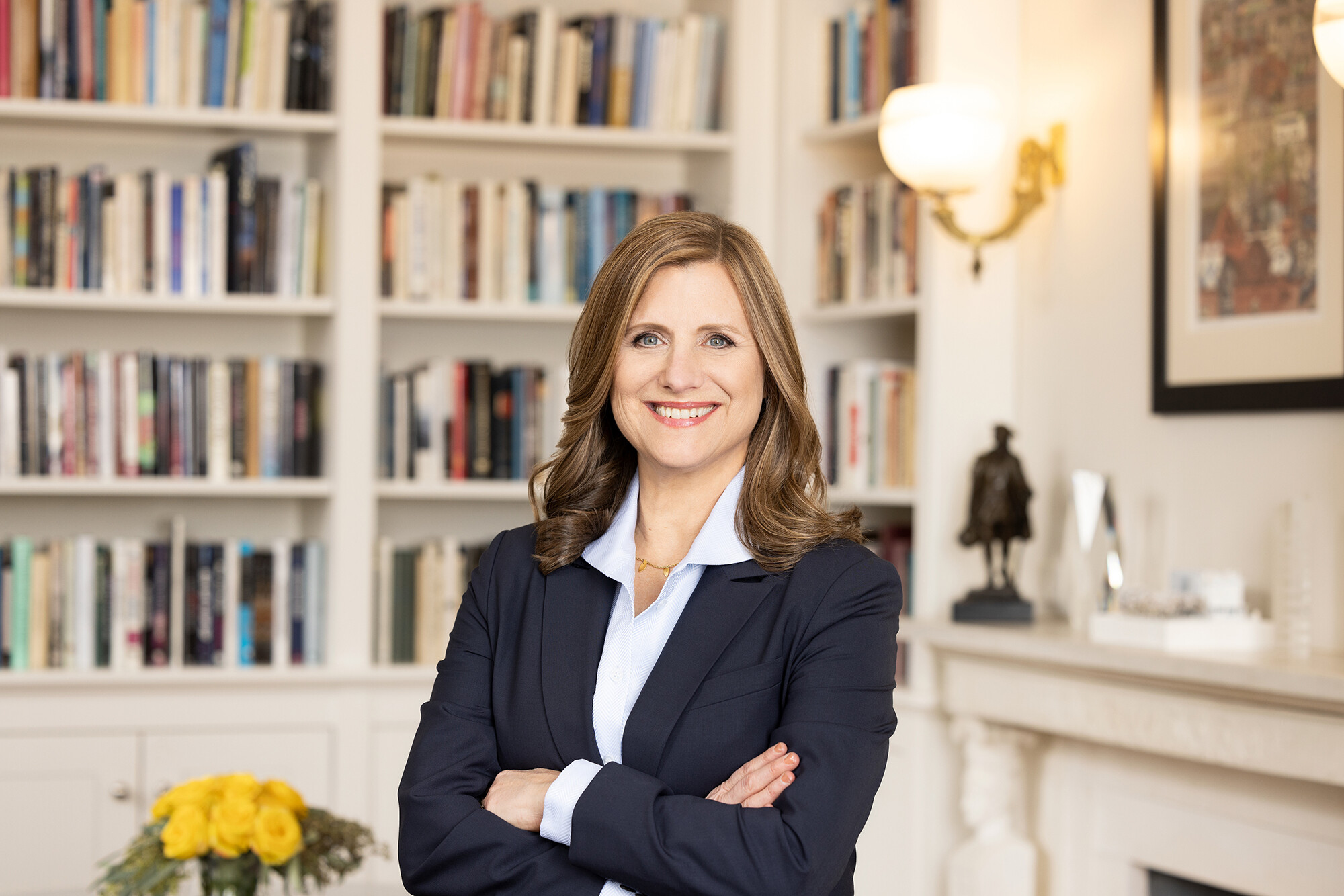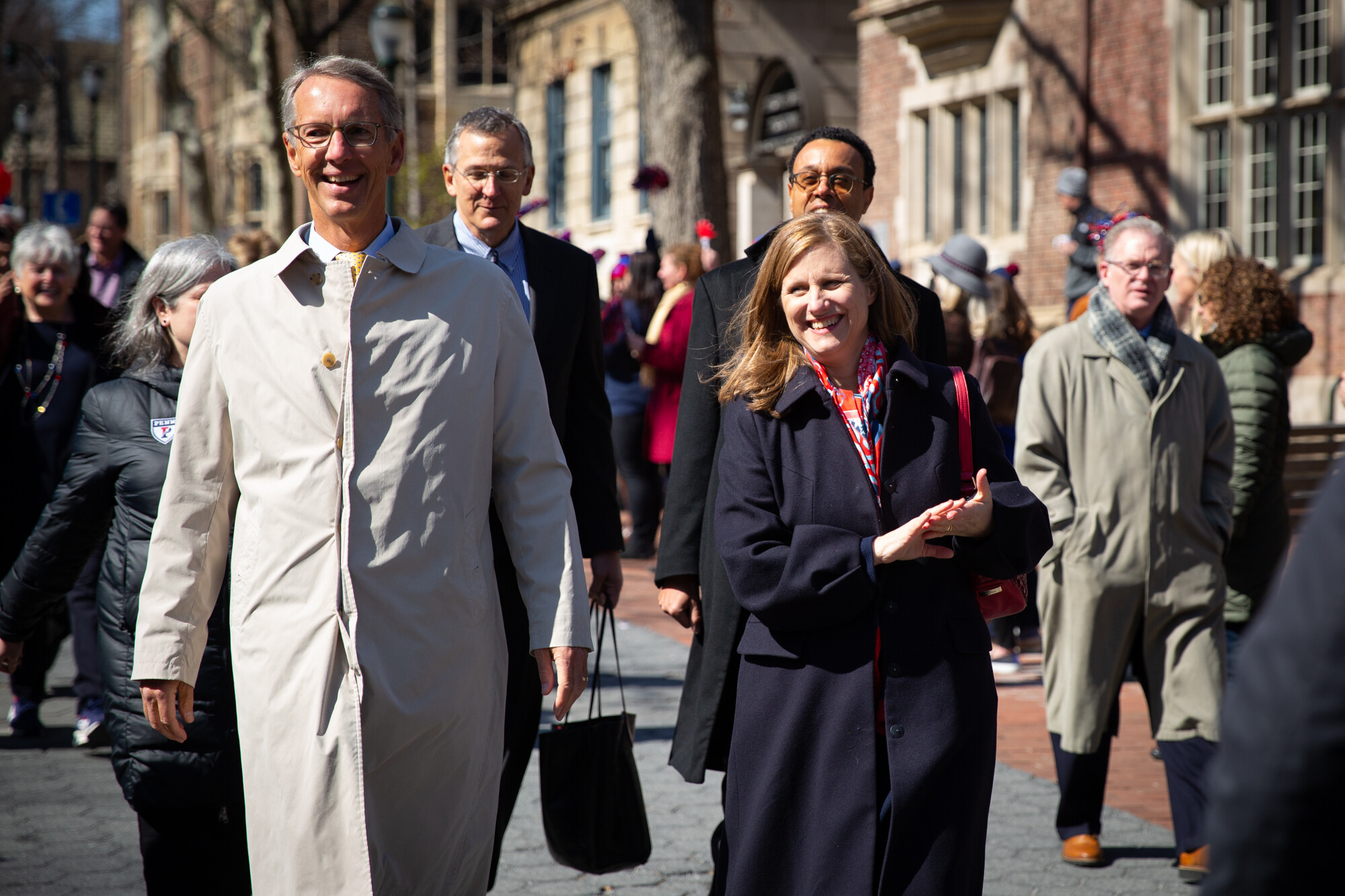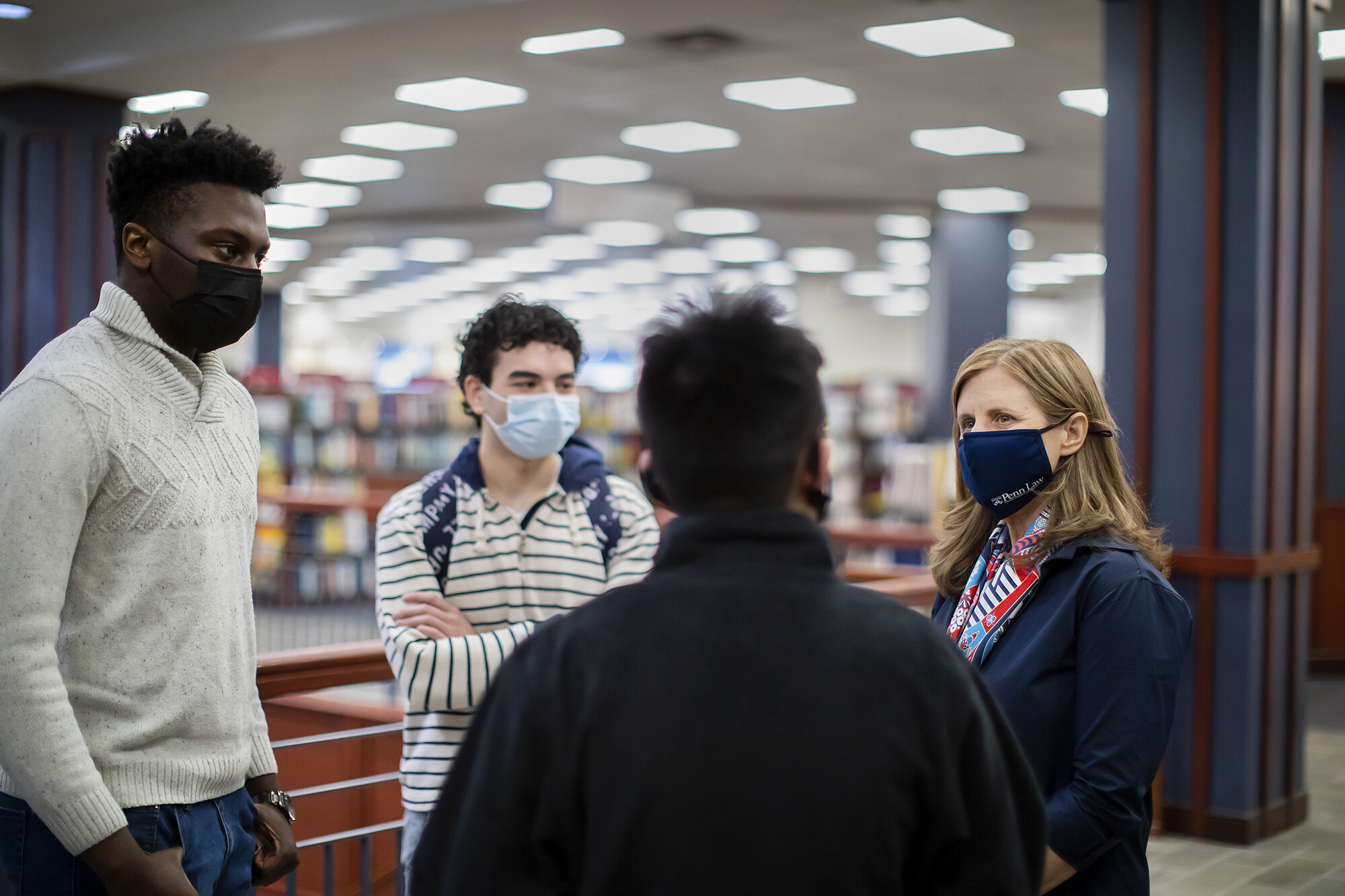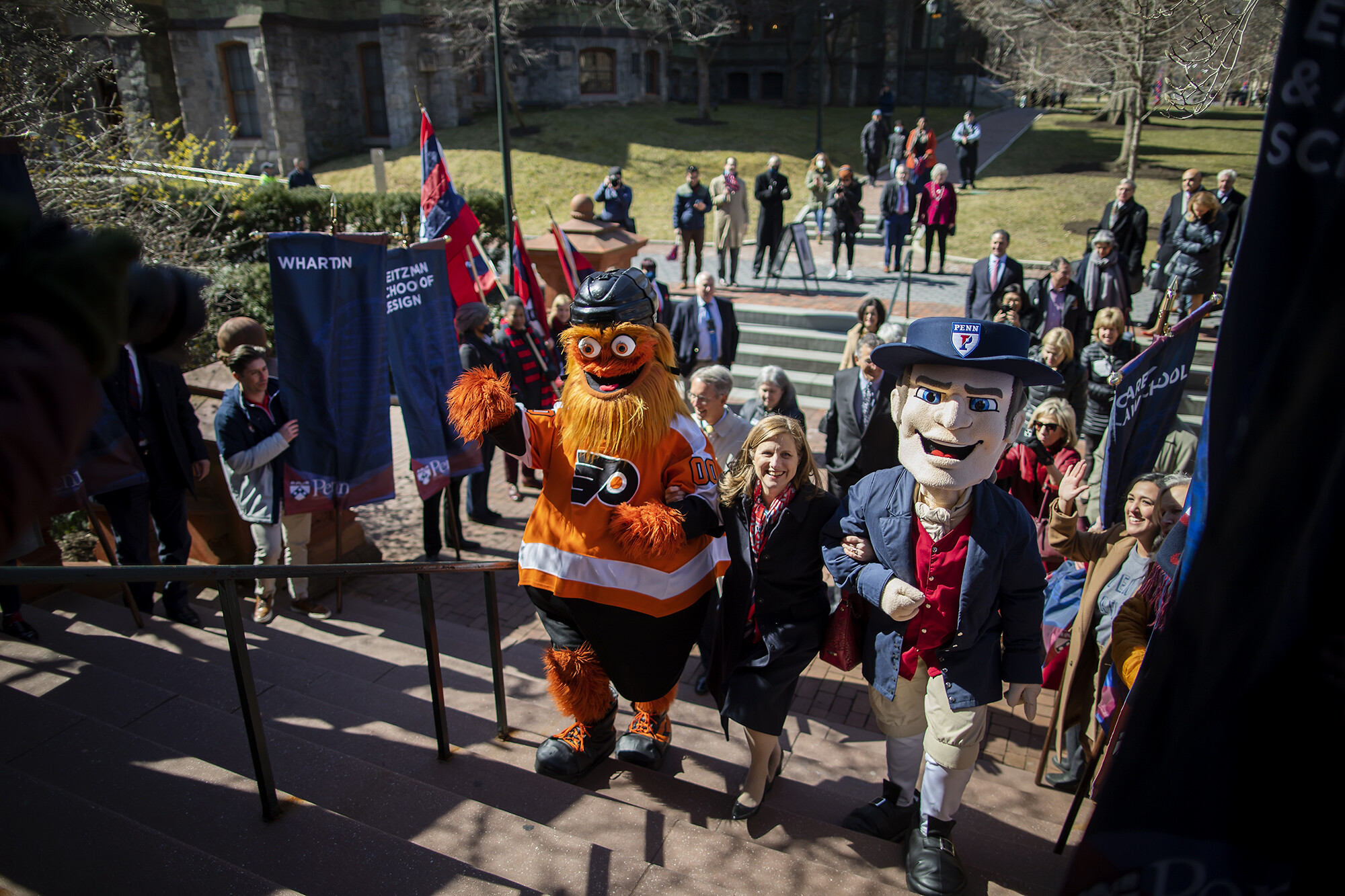
Griffin Pitt, right, works with two other student researchers to test the conductivity, total dissolved solids, salinity, and temperature of water below a sand dam in Kenya.
(Image: Courtesy of Griffin Pitt)

Liz Magill, who will officially assume her duties as the University’s president this Friday, has said it again and again: “I firmly believe that Penn has, does, and will continue to change the world for the better.” What excites her most about her new role, she says, is being able to help chart Penn’s course for the future.
“It’s an enormous privilege,” she says, adding, “and a huge responsibility.”
Originally from Fargo, North Dakota, Magill attended Yale for her bachelor’s degree in history and the University of Virginia—where she most recently served as provost and executive vice president—for her Juris Doctor degree. A fellow of the Academy of Arts and Sciences, she served as dean of Stanford Law from 2012 to 2019.
Before working in higher education, Magill was a senior legislative assistant for energy and natural resources for U.S. Sen. Kent Conrad. She later clerked for Judge J. Harvie Wilkinson III of the U.S. Court of Appeals for the Fourth Circuit and then for U.S. Supreme Court Justice Ruth Bader Ginsburg.
Talking recently with Penn Today, Magill shared insights about her scholarship and her background, what excites her about living in Philadelphia, why she is inspired by the Penn community, and more.

I have always been interested in government, its structure, and how government interacts with and relates to individuals. My scholarship is at the intersection of two fields that define these relationships—constitutional and administrative law. It has focused on the separation of powers between the legislative, executive, and judicial branches at the federal level; the role and function of agencies is deeply influenced by ideas about separation of powers. And I have also focused on the legal and political constraints on the actions of agencies that are a central part of the modern federal government. Like a lot of legal scholarship, my work has been heavily influenced by other fields—in particular, history as well as political science.
The project I put on hold when I became a law school dean is a book about the period between the middle of the 1960s and into the early 1970s, when at the federal level Congress and the President approved a whole new generation of regulatory statutes, including the creation of new federal agencies, which had the objective of preserving the environment—endangered species, wilderness, clean air, and clean water—and improving health and safety of consumers and workers (auto and workplace safety). One day, I will get back to it. I have taught constitutional and administrative law and connecting with students in the classroom is rewarding and inspiring; I will never tire of it. I look forward to engaging with Penn students both in and out of the classroom.
I have a lot more to learn, which I will do in the coming weeks and months. What have I seen so far? Twelve extraordinary schools, each internationally acclaimed and attracting students from every corner of the world, collected on a beautiful urban campus; proudly in and of Philadelphia, one of the greatest cities in the world; a place that works to be a good neighbor, citizen, and partner in West Philadelphia and in Philadelphia; a place that excels at so much, and yet is not the least bit self-satisfied, which means its people are innovative and willing to take risks. It is a place that is committed—deeply—to making a difference in the wider world through research and teaching. And, finally, at the foundation of all this, Penn is a place with deep-seated values that reflect respect for all and a sincere commitment to service, to diversity in all its forms, and to creating conditions where all can thrive so we can as a Penn community have our greatest impact on the world.
I look forward to ramping up my efforts to get to know the Penn community—our students, faculty, and staff in Philly, and also our trustees and advisors, alumni, friends, and parents who are all over the world. And I want to get to know our neighbors and partners in West Philly and in the city. I want to learn who they are and their boldest aspirations for the future of Penn.

1. Start and lead with your values. 2. A high-performing and well-functioning team is everything when you are in a crisis. 3. Communication is also everything when you are in a crisis, and even when you’re not.
I grew up in Fargo, North Dakota, and I am the fourth of six children; I have one sister and four brothers. Among the many gifts of my life is the family I was lucky enough to be born into, and the life my parents created for all of us. Another gift of my life is my own little family. My husband Leon Szeptycki and I met at Yale, and we have been married for 32 years this summer. We have a son, Alex, who is 24, and a daughter, Claire, who is 21.
Along the way, I have learned so much from others that it’s hard to pick a few. Two of my undergraduate professors made me want to spend my life in higher education as a teacher and scholar: Nancy Cott and David Brion Davis. The U.S. Senator I worked for, Kent Conrad, taught me that you can be serious about policy and leadership while maintaining a sense of humor. Three law professors helped me realize my dream of joining the academy: Lillian BeVier, John Hart Ely, and Mike Klarman. Many academic leaders at UVA Law School, especially John Jeffries, taught me everything I know about academic leadership, and John Etchemendy, the provost at Stanford, and President Jim Ryan at UVA, taught me the rest. And, finally, Justice Ruth Bader Ginsburg, who I worked for as a clerk at the Supreme Court, was a role model for me in so many ways, both professional and personal. As you might be able to tell from this answer, I have been lucky to have a lot of role models and, honestly, every day I learn from the people I work with.

Although I am new to residing in Philly, I have been here often and have been a superfan for a long time, dating to a family car trip here that my parents organized as part of the Bicentennial of the Declaration of Independence in 1976. In the last few months, I have reveled in Philly greatness via Questlove—like everyone, I loved ‘Summer of Soul’ and I am also a regular listener to his podcast, Questlove Supreme. More broadly, I love history, art, music, food, sports, and walking and biking, so it’s hard to know where to start. I will be walking a lot of places every day, as often as possible with our dog, and I will try to sample a little bit of each of these things every week. I would also like to find a way to regularly get on the Schuylkill, as I love being on the water.
There is a lot I love to do, but I don’t have one or two hobbies that I go back to again and again. When I have free time, I want to spend time with my family. I love to travel, especially to the mountain west, the southwest, and any ocean or coast. I enjoy hiking and fly fishing (I am a relative novice at the latter, but I am enthusiastic). My husband and I took up kickboxing as a form of exercise a few years ago and we both love it. I am a big consumer of news; I read as much as I can and when I can I like to read modern fiction. I like cooking and baking when I have the time. My husband, who has one very significant and serious hobby—fishing in all its forms—often jokes that I need a hobby. I think I have many, just none of them particularly serious.
That depends on what they already know about me! But let’s see. I cannot carry a tune, I believe ‘Deadwood’ is one of the greatest TV shows ever made, Wilco is my favorite band, Tolstoy’s ‘Anna Karenina’ is my favorite novel, and my husband and I are crazy for our dog Olive. Of all these surprising (or not) surprising things, having grown up in Fargo, North Dakota, probably tops the list. That always prompts a double take.

Penn Today Staff

Griffin Pitt, right, works with two other student researchers to test the conductivity, total dissolved solids, salinity, and temperature of water below a sand dam in Kenya.
(Image: Courtesy of Griffin Pitt)

Image: Andriy Onufriyenko via Getty Images

Four women street vendors sell shoes and footwear on a Delhi street.
(Image: Kannagi Khanna)

nocred